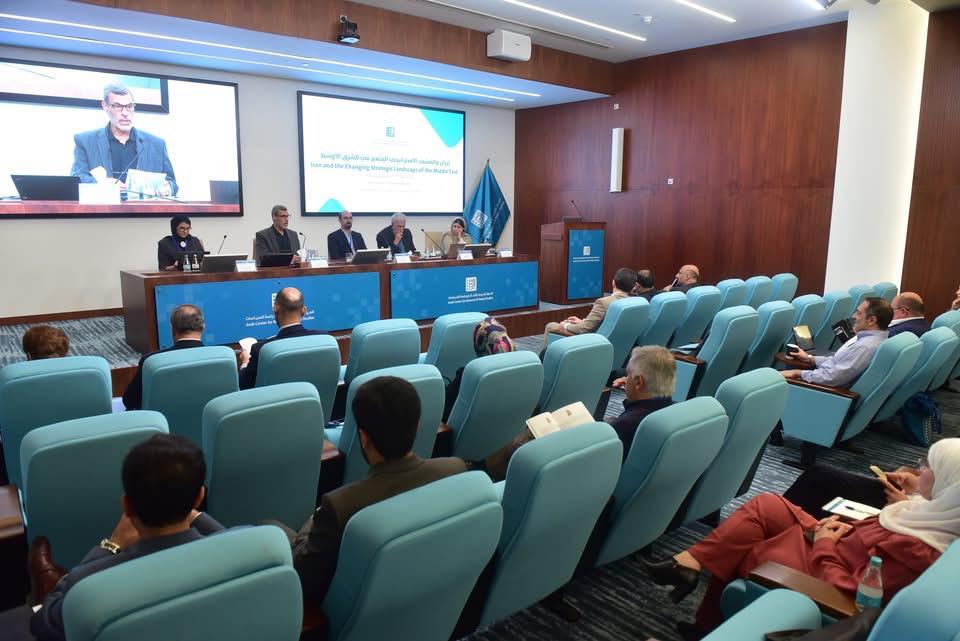
Conference On Iran And Changing Landscape Of Middle East Opens
DOHA: The Iranian Studies Unit Fifth Annual Conference titled,“Iran and the Changing Strategic Landscape of the Middle East” commenced yesterday.
The two-day event gathers researchers and experts from around in an academic space for participants to examine various aspects of Iranian foreign and security policy in relation to its immediate environment and the rest of the Middle East.
Professor of Government at Georgetown University Qatar and Head of the Iranian Studies Unit at the Arab Centre for Research and Policy Studies (ACRPS) Mehran Kamrava, convened the programme with opening remarks in which he welcomed the participating researchers and attendees.
The opening remarks session was immediately followed by a keynote address by Iran's Deputy Foreign Minister and President of the Institute of Political and International Studies (IPIS) Dr. Saeed Khatibzadeh.
In his speech,“Iran's Perspective on Security Circumstances in the Region,” Khatibzadeh called out Israel's targeted killing of many of Iran's commanders in the middle of the night and reiterated that this attack“failed to paralyse” Iran's armed forces, noting that Tehran“balanced and pushed” back against the aggressor Israel for the first time in the latter's history.
Khatibzadeh emphasised that the region is undergoing a transition, urging a collective action to address this up and rising motion:“I don't want to be alarming, but everything alarms us.”
Addressing Syria under the former Bashar Al-Assad regime, Khatibzadeh addressed the questions around the Arab world's chronic distrust with Iran, emphasising that post-revolution Iran“is an issue which was securitised, demonised by Americans by those who couldn't digest the new realities in Iran [...] the only country who dared to attack Iran was an Arab country, was a majority Shi'i country, Iraq.”
The first panel,“Iran's Deterrence Models and National Security Revisions,” moderated by Aicha Elbasri, hosted papers by Hamidreza Azizi, Saeed Shokoohi, and Mohammad Seyam. Presenting on his paper,“The Collapse of 'Forward Defence': Rethinking Iran's National Security Doctrine After the Twelve-Day War,” Azizi examined the collapse of Iran's“forward defence” doctrine in the wake of the 2023–2025 regional escalation culminating in the June 2025 war with Israel.
He argued that Iran's doctrine has unravelled as its strategy to deter conflict through strategic depth, delegated deterrence, and hybrid military capabilities proved ineffective under direct confrontation. He further noted that Iran's future deterrence doctrine will require more than incremental adjustments; it requires a redefinition of power projection, security and economic vulnerabilities, among other needs.
Shokoohi on the other hand presented on“Operational Code: A Framework for Understanding Tehran's Perspective on the Middle Eastern Turmoil,” in which he explained how Iran's foreign policy behaviour has long posed analytical challenges, particularly amid recent regional upheavals and following Israel's 13 June surprise attack.
The second panel“Transnationalism and the Nuclear Question in Iran's Security Strategy” was moderated by Ayat Hamdan. Abdolrasool Divsallar presented his paper titled“The Failure of Hyper Nuclear Latency as a Deterrence Model: The Case of Iran”.
He argued that due to conventional military weaknesses, Iran would require years to overcome the complex challenges of integrating a nuclear warhead into its military and developing a nuclear doctrine. In the second paper of the session,“Iran and Regional Hegemony: The Role of Ideational and Material Elements and Endeavours to Achieve It Through the Nuclear Program and Proxies”, Adel Al-Hawatmeh looked into the role of material and ideational elements in shaping Iran's identity and national interest.
The third and final panel of the day,“Iran's Strategic Doctrine Post-October 7”, was moderated by Abdelfattah Mady. It started with Abbas Maleki and Maryam Hasheminejad's presentation on“Iran's Strategic Calculus After the 2023 Gaza War: Balancing Deterrence and Regional Security Coalitions”.

Legal Disclaimer:
MENAFN provides the
information “as is” without warranty of any kind. We do not accept
any responsibility or liability for the accuracy, content, images,
videos, licenses, completeness, legality, or reliability of the information
contained in this article. If you have any complaints or copyright
issues related to this article, kindly contact the provider above.


















Comments
No comment